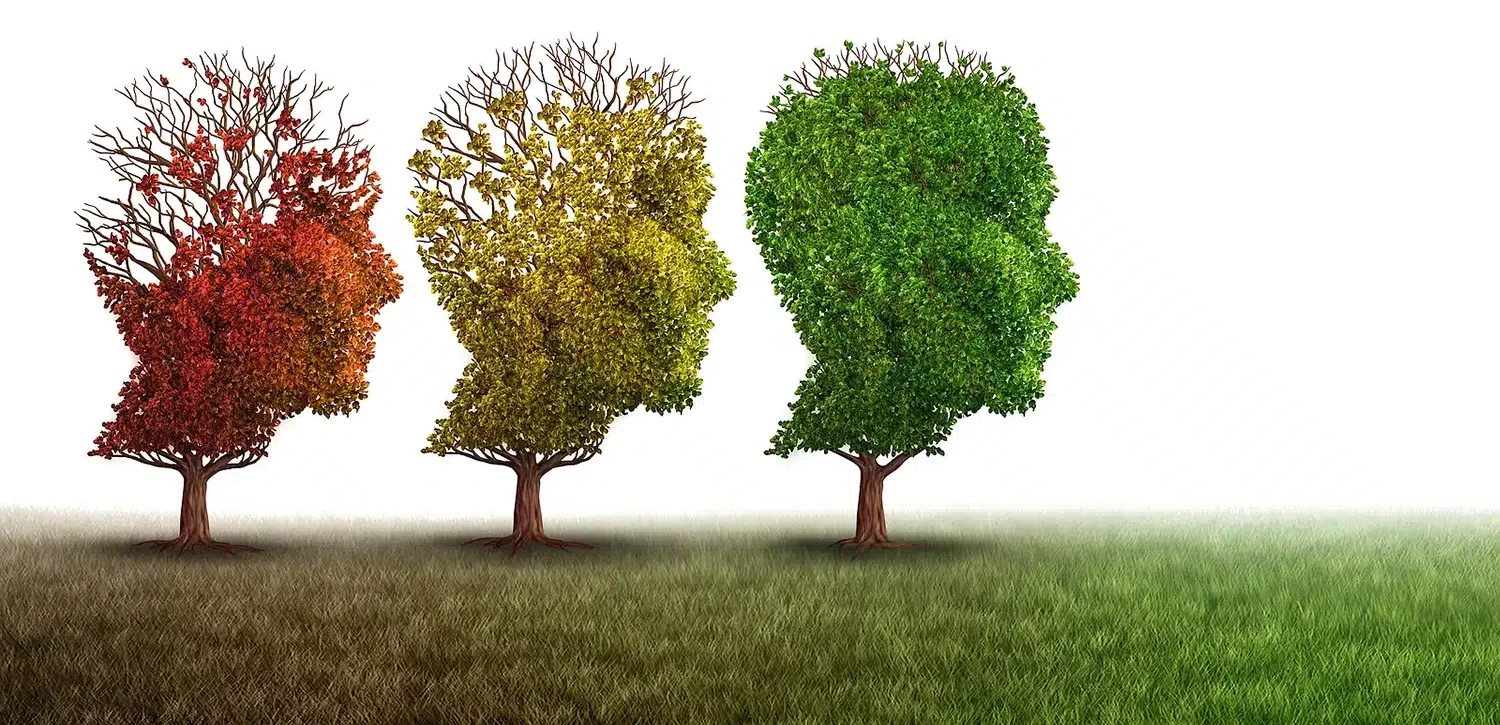
Are you considering getting help for your addiction or in early recovery? Many people ask themselves, “How long does it take to rewire your brain from addiction?” The short answer is that it varies depending on the person and their addiction recovery path.
Not everyone’s brain will rewire at the same pace. Many factors come into play, like the length of your active addiction, the amount used, how young you were when you started your addiction, and environmental factors.
How Does Addiction Affect the Brain?
The brain plays a central part in active addiction as well as your recovery. When you’re struggling with a chemical addiction or a process addiction, like gambling, your brain has gone through many changes that affect the reward center. When this happens, your brain needs time to relearn how to distribute reward sensations like dopamine and impulse control.
Addiction affects the neurotransmitter systems of your brain. For example, using drugs, alcohol, or an addictive behavior may increase the release of dopamine. This leads to feelings of euphoria and reduced inhibitions. Long-term substance abuse can alter the normal balance of neurotransmitters. This impacts mood, pleasure, and motivation.
Chronic addiction issues can lead to structural changes in the brain. This includes alterations in the size and functioning of various brain regions. It can affect decision-making, impulse control, and learning. Addiction can impair cognitive functions such as attention, memory, and decision-making. Long-term use may contribute to difficulties in learning new information and your ability to retain it.
Substances can hijack the brain’s reward system, leading to persistent cravings and a decreased ability to experience pleasure from natural rewards. This contributes to the cycle of addiction.
Alcohol and the Brain
Alcohol affects the (GABA) neurotransmitter system, leading to increased inhibitory signals in the brain. This contributes to the sedative and relaxing effects of alcohol. It also increases dopamine levels in the brain’s reward system, contributing to feelings of pleasure and reinforcing the urge to drink. Alcohol is also a central nervous system depressant. Drinking alcohol can slow cognitive function, impair motor skills, and decrease inhibitions.
Once your brain is used to outside substances stimulating the reward system, it decreases its ability to produce these chemicals. This can lead to increased anxiety and depression issues. Your brain will need to relearn self-regulation once you have gone through a medical detox and start recovery from alcoholism.
Drugs and the Brain
Different drugs affect the brain in various ways. Stimulant drugs, such as cocaine or meth, increase the release of dopamine and norepinephrine, leading to heightened alertness, energy, and euphoria. Opioid drugs, including heroin or prescription pain medication, activate opioid receptors in the brain, resulting in pain relief, sedation, and a sense of euphoria. Some drugs like MDMA impact serotonin and norepinephrine levels. This leads to increased mood and energy.
Drug use can lead to your brain decreasing its ability to self-regulate chemical signals that affect mood, anxiety, impulse control, and depression on its own once you have stopped using.
Luckily, our brains can “relearn” or bounce back from extended substance dependence. This is called neuroplasticity. With time and specialized therapies, your brain can learn to thrive without the outside chemical influence of addiction.
Co-occurring Substance Abuse and Mental Health Disorders

Substance abuse is closely linked to an increased risk of mental health disorders. Long-term drug or alcohol use can contribute to or improve conditions such as anxiety, depression, and psychosis. Those with a mental health disorder may turn to substance abuse as a form of self-medication to relieve symptoms of ailments such as anxiety, depression, or PTSD. This can provide temporary relief but often makes mental health issues worse in the long run.
It is important to address underlying mental health issues during the rewiring process. If you have a mental health condition that is causing a chemical unbalance in your brain, it is important to address it. Ensuring the chemical makeup of your brain is addressed will help the rewiring process.
How Long Does It Take for Your Brain to Return to Normal After Recovery?
In an interesting twist, the brain’s natural plasticity helps contribute to addiction in the first place. But it is also key in your brain returning to normal after recovery from drugs and alcohol. Addiction science has just begun researching the brain’s return to normal following a period of sobriety. Early evidence suggests that over months of sobriety, the brain may see a reverse of the damage done by substance abuse.
What Does the Rewiring Process Look Like?
Research into treatment suggests that a combination of medication-assisted treatment (MAT) and behavioral therapy is the best course of action to normalize brain function in those struggling with addiction. Two such behavioral therapies, Cognitive Behavioral Therapy (CBT) and Dialectical Behavior Therapy (DBT), are used by addiction treatment centers across the country.
Cognitive Behavioral Therapy (CBT)
CBT is a form of therapy that explores the link between thoughts, feelings, and behaviors. CBT helps reveal cognitive distortions behind personal challenges. Cognitive distortions can include things like false beliefs or biased information. A therapist will help you identify and change these dysfunctional thought patterns, rewiring the brain and replacing those thoughts with more productive ones.
Dialectical Behavior Therapy (DBT)
Dialectical behavior therapy (DBT) is a popular behavioral therapy that can help you not react to your inner emotions in an outwardly negative way, like when stressed. DBT is based on dialectics, meaning seemingly contradictory things can work together in harmony. For example, an important concept in DBT is that you should accept yourself completely. At the same time, DBT encourages and teaches methods that help you change. DBT is a solution-based therapeutic approach that offers immediate tools and strategies to help you change harmful behavior or deal with overwhelming emotions that can be triggering for anyone in the early stages of recovery
Group Therapy for Rewiring Your Brain

Much like DBT and CBT, group therapy allows you to learn new coping skills in a social group setting while being guided by a therapist or addiction counselor. You can practice your new skills with your peers and discuss challenges during group therapy.
Family Therapy for Rewiring Your Brian After Addiction
Family therapy can be productive for people who struggle with family issues and trauma. A therapist will help you and your family address conflict and develop solutions to family patterns that can lead to cravings and possible relapse.
Medical Management and Medication Assisted Treatment (MAT)
With the guidance of a medical professional, people find that using mental health medications and MAT drugs helps them stay on track to their neurological and emotional recovery from substance abuse.
Medications may be prescribed to help manage underlying mental health conditions like depression, anxiety, and bipolar. These medications can help stabilize the underlying issues that might have led you to self-medicate, in turn leading to addiction.
For people who are addicted to alcohol and certain opioids and prescription drugs, their treatment team may deem medication-assisted treatment as a course to not only sustain sobriety but jumpstart the rewiring of their brains from addiction. These drugs can help with rebalancing the brain’s chemicals, reducing cravings, and blocking the pleasurable effects of the drugs or alcohol.
Continued Care for Sustained Sobriety and Brain Recovery
There is evidence that sustained sobriety can lead to cognitive repair and the structure of your brain returning to a non-addictive function. Things you can do to encourage long-term sobriety to support the rewiring of your brain after addiction:
- Attending a Treatment Program: Studies show that entering a structured treatment program gives you time to learn new coping strategies and start to develop new habits to help rewire your brain’s neuro pathways.
- 12-Step Support Groups: Participation in support groups, such as Alcoholics Anonymous (AA) or Narcotics Anonymous (NA), where individuals can share their experiences, receive support, and build a sober network. These support groups can help you develop new tools when facing challenges. This gives your brain a better chance at using positive skills rather than resorting to relapse.
- Support System: Establish a system of support you can rely on when you start to feel the urge to use drugs or alcohol. When you have a healthy support system, you will feel more open to being vocal about challenges and feel supported in your recovery. Having a safe place to talk about your sobriety and its challenges will open pathways that can help aid the rewiring of your brain after addiction.
- Stress Management: Stress is one of the biggest factors that can lead to cravings and, eventually, a possible relapse. Having a stress management plan and knowing when you’re at your limit can help better support sustained sobriety and healthy thought patterns.
- Self-Care: Engaging in activities like hobbies you enjoy, meditation, yoga, and other activities to help support your mental health and well-being can help support sustained sobriety and healthy brain activity. Many of these activities can ignite the reward center of your brain. They can rewire your brain to seek positive activities rather than relying on chemical abuse to trigger your brain’s reward center.
- Having a healthy diet and regular exercise can not only set a routine that supports brain health but also give you the physical support you need to stay not only sober but also healthy.
The good news is that your brain can rewire after addiction. If you accept help and follow a guided program for recovery, you can experience a neurological change in not only your brain’s function but also its chemical makeup.
If you’re considering seeking help for addiction, we are here. Taking the first step towards recovery can be overwhelming. Let Vogue Recovery Center guide you to that first step and begin your journey to sobriety and a life free from addiction.
REFERENCES:
Drugs, Brains, and Behavior: The Science of Addiction: Drugs and the Brain | NIDA (nih.gov)
The Role of GABAA Receptors in the Development of Alcoholism | PubMed Central – NIH Library
Self-Assessment: Am I Addicted?
"*" indicates required fields

Evan Gove

Latest posts by Evan Gove (see all)
- How Long Does It Take to Rewire Your Brain from Addiction? - March 4, 2024
- How Long Is Alcohol Rehab? - February 12, 2024





 Medically Reviewed by
Medically Reviewed by